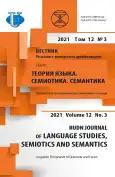Хештег как лингвокогнитивная единица испанского политического дискурса
- Авторы: Ларионова М.В.1, Демкина А.В.2
-
Учреждения:
- Московский государственный институт международных отношений (университет) Министерства иностранных дел Российской Федерации
- Посольство Российской Федерации в Аргентинской Республике
- Выпуск: Том 12, № 3 (2021): Лингвистические доминанты грамматики и словаря
- Страницы: 774-788
- Раздел: ДИСКУРСИВНЫЕ ПРАКТИКИ И АНАЛИЗ ТЕКСТА
- URL: https://journal-vniispk.ru/2313-2299/article/view/323365
- DOI: https://doi.org/10.22363/2313-2299-2021-12-3-774-788
- ID: 323365
Цитировать
Полный текст
Аннотация
Представлены результаты анализа дискурсивных особенностей функционирования хештегов в испанском политическом дискурсе на материале интернет-публикаций правительства, министерств и ведомств Испании, посвященных противодействию коронавирусной инфекции. Цель исследования состоит в осмыслении хештега как дискурсивной единицы с точки зрения теоретического языкознания, теории дискурса, когнитивистики и прагмалингвистики. Выявлены значимые лингвокогнитивные параметры функционирования хештегов в испанской политической коммуникации, обусловливающие силу их речевого и прагматического воздействия как инструмента для структурирования политической повестки в интересах адресанта и средства манипулятивного воздействия на сознание и поведение адресата. В контексте междисциплинарного подхода к изучению хештега как многоаспектного явления дискурсивной действительности в испанской политической коммуникации используется комплекс методов системного лингвистического исследования - лингвокогнитивный, прагмалингвистический, семантический, сравнительно-сопоставительный и контекстуальный, а также дискурс-анализ. Уточняется статус хештега в качестве самостоятельной категории дискурса, иными словами единицы значимой информации, которая целостно передает оформленное содержание в среде интернет-коммуникации. В соответствии с функциональным критерием обосновывается следующая таксономическая классификация хештегов: хештеги-прототипы ситуации или события, хештеги-концепты, хештеги-метафоры, хештеги-императивы и хештеги-перформативы. Ключевые когнитивно-прагматические и языковые характеристики хештега включают: метатекстовую структуру, семиотическую поликодовость, гипертекстуальность, интерактивность, интенциональность, манипулятивный потенциал, упрощенный синтаксис, частотное употребление перформативных и императивных глаголов для интенсификации призыва к действию, эмоциональность, эмпатийность, использование механизма «игры слов» для облегчения запоминания ключевого сообщения, повторы, ритмичность.
Ключевые слова
Об авторах
Марина Владимировна Ларионова
Московский государственный институт международных отношений (университет) Министерства иностранных дел Российской Федерации
Автор, ответственный за переписку.
Email: larionova.m@list.ru
ORCID iD: 0000-0001-6466-7363
к. филол. н., доцент, доцент кафедры испанского языка
119454, Российская Федерация, Москва, пр-т Вернадского, 76Анастасия Владимировна Демкина
Посольство Российской Федерации в Аргентинской Республике
Email: a.v.dyomkina@yandex.ru
ORCID iD: 0000-0002-3233-8503
к. филол. н., атташе Посольства Российской Федерации в Аргентинской Республике
1741, Аргентинская Республика, Буэнос-Айрес, ул. Родригес Пенья, C1021ABKСписок литературы
- Demyankov, V.Z. (2002). Political discourse as a subject of political science philology. Political Science. Political Discourse: History and Contemporary Research. 3, 32—43. [Electronic resource] URL: http://www.infolex.ru (accessed: 22.04.2020). (In Russ.).
- Mikhaleva, O.L. (2009). Political discourse: Specificity of manipulative influence. Moscow: LIBROKOM publ. (In Russ.).
- Bakhtin, M.M. (1975). Forms of time and chronotope in the novel. Essays on historical poetics. In Questions of literature and aesthetics. Moscow: Art. Lit. pp. 234—407. (In Russ.).
- Ivanov, N.V. (2007). Intertext — metatext: culture, discourse, language. In Language contexts: structure, communication, discourse. Materials of the interuniversity scientific conference on actual problems of language and communication. Military University. Moscow: Book and Business. (In Russ.).
- Karasik, V.I. (2018). Addressee specialization in public political discourse. RUDN Journal of Language Studies, Semiotics and Semantics, 9(1), 32—49. doi: 10.22363/2313-2299-2018-9-1-32-49 (In Russ.).
- Larionova, M.V.& Slivchikova, Yu.V. (2019). Modern Spain: New Political Reality — New Political Discourse. Tomsk state university journal of philology, 59, 53—66. (In Russ.).
- Chudinov, A.P. (2006). Metaphorical mosaic in modern political communication. Moscow: Flinta. (In Russ.).
- Sheigal, E.I. (2000). Semiotics of political discourse. Volgograd. (In Russ.).
- Sheigal, E.I. (2010) Genre space of political discourse. [Electronic resource] URL: http://www.filologija.vukhf.lt/5-10/doc/1.2%20Sheigal%20RED_VM.doc (accessed: 22.12.2020). (In Russ.).
- Castells, M. (2007). Communication, Power and Counter-power in the Network Society. International Journal of Communication, 1, 238—266.
- Dijk, T.A. van. (1995). Discourse semantics and ideology. Discourse & Society, 6(2), 243—289.
- Dijk, T.A. van. (2013). Discourse and Power: Representation of Dominance in Language and Communication. Moscow: LIBROKOM. (In Russ.).
- Dijk, T.A. Van. (1998). What is Political Discourse Analysis. Amsterdam. [Electronic resource] URL: http://www.discourse-in-society.org (accessed: 26.12.2020).
- Howarth, D., Norval, A. & Stavrakis, Y. (2000). Discourse Theory and Political Analysis: Identities, Hegemonies and Social Change. Manchester: Manchester University.
- Lakoff, G. (2007). No pienses en un elefante. Lenguaje y debate político. Madrid: Foro Complutense.
- Anderson, M. & Hitlin, P. (2016). The hashtag #BlackLivesMatter emerges: Social activism on Twitter. Pew Research Center, 15, 1—34.
- Krasina, E.A. (2016). Discourse, utterance and speech act. RUDN Russian Journal of Linguistics, 20(4), 91—102. (In Russ.).
- Navoloka, Yu.S. (2018). Hashtag text as a new text format in the Internet space (on the example of the social network Instagram). Philological Sciences. Questions of theory and practice. 12—3(90). [Electronic resource] URL: https://cyberleninka.ru/article/n/heshteg-tekst-kak-novyy-format-teksta-v-internet-prostranstve-na-primere-sotsialnoy-seti-instagram (accessed: 03.12.2020). (In Russ.).
- Ha Rim Rho E. & Mazmanian, M. (2020). Political Hashtags & the Lost Art of Democratic Discourse. In: Proceedings of the 2020 CHI Conference on Human Factors in Computing Systems (CHI ’20). Association for Computing Machinery, New York, USA. New York. pp. 1—13. doi: 10.1145/3313831.3376542
- Bonilla, Y. & Rosa, J. (2015). #Ferguson: Digital protest, hashtag ethnography, and the racial politics of social media in the United States. American Ethnologist, 42, 4—16.
- Novikova, S.A. (2014). Russian hashtags of the Twitter microblog as a political identification marker. Socium and Power, 5(49). [Electronic resource] URL: https://cyberleninka.ru/article/ n/rossiyskie-heshtegi-mikrobloga-tvitter-kak-politiko-identifikatsionnyy-marker (accessed: 03.12.2020). (In Russ.).
- Atyagina, A.P. (2012). Twitter as a new discursive practice. Herald of Omsk University, 4(66), 203—209. (In Russ.).
- Bart, R. (1994). Selected Works: Semiotics. Poetics. Moscow: Progress. (In Russ.).
- Kristeva, Y. (2000). Bakhtin, word, dialogue and novel. French semiotics: From structuralism to poststructuralism. Moscow: IG Progress. pp. 427—457. (In Russ.).
- Fillmore, Ch. (1988). Frames and semantics of understanding. In: New in foreign linguistics. Cognitive aspects of language. XXIII. Moscow: Progress. pp. 52—92. (In Russ.).
- Kobozeva, I.M. (2000). Linguistic semantics. Moscow: URSS. (In Russ.).
- Yanow, D. & Van Hulst M. (2011). Frames of the political: from frame analysis to framing analysis. Sociological Review, 10(1—2), 87—110. (In Russ.).
- Bezos López, J. (2015). Manual del español urgente. Fundéu BBVA. Barcelona: Editorial Debate.
- Larionova, M.V. & Demkina, A.V. (2020). Lógica y pragmática del marco ‘feminismo’ en discurso de Unidos Podemos. Andamios, 17(42), 407—421. doi: 10.29092/uacm.v17i42.749
- Shchurina, Yu.V. (2015). Communicative-game potential of hashtags. Bulletin of the Cherepovets State University, 8(69). [Electronic resource] URL: https://cyberleninka.ru/article/ n/komunikativno-igrovoy-potentsial-heshtegov (accessed: 03.04.2020). (In Russ.).
Дополнительные файлы









